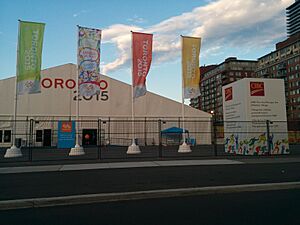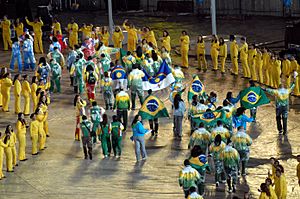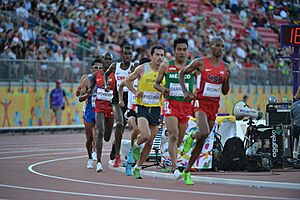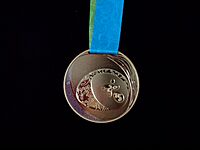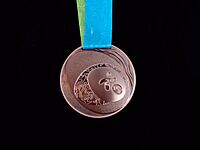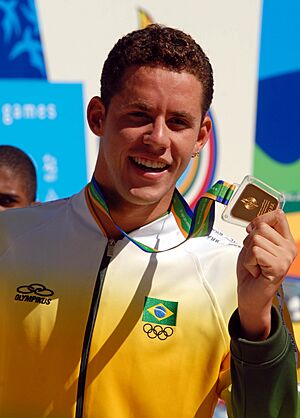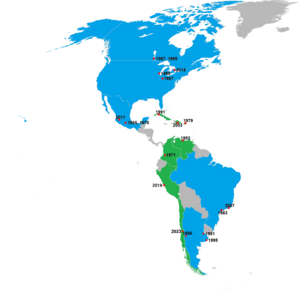Pan American Games facts for kids
Quick facts for kids Pan American Games |
|
|---|---|
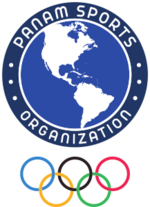 |
| Abbreviation | Pan Am Games |
|---|---|
| First event | 1951 Pan American Games in Buenos Aires, Argentina |
| Occur every | Four years |
| Last event | 2023 Pan American Games in Santiago, Chile |
| Purpose | Multi-sport event for nations in the American continents |
The Pan American Games, often called the Pan Am Games, is a huge sports event for countries in the Americas. It's like a mini-Olympics for North, Central, and South America, plus the Caribbean! Thousands of athletes compete in many different summer sports.
These exciting games happen every four years, always the year before the Summer Olympics. The first Pan Am Games were held in 1951. This makes them the second-oldest continental games in the world. There was also a Winter Pan American Games once, in 1990. In 2021, the Junior Pan American Games started, just for younger athletes.
The Pan American Sports Organization (PASO) is the group that runs the Pan American Games. They make sure the games follow rules similar to the Olympic Charter.
The most recent Pan Am Games were the 19th edition, held in Santiago, Chile, from October 20 to November 5, 2023. The 20th Pan Am Games will be held in Lima, Peru, in 2027. Since 2007, cities that host the Pan Am Games also host the Parapan American Games. These games are for athletes with physical disabilities and happen right after the main Pan Am Games.
The Pan Am Games involve many groups: international sports federations, national Olympic committees, and the teams that organize each specific game. PASO chooses which city will host the games. The host city then organizes and pays for the event. The sports played at the games are also chosen by PASO. The games have special traditions, like a flag, a torch relay, and big opening and closing ceremonies. More than 5,000 athletes compete in about 36 sports and nearly 400 events. Athletes who come in first, second, or third place get gold, silver, or bronze medals.
Contents
History of the Pan Am Games
How the Games Started
The idea for the Pan American Games first came up at the 1932 Summer Olympics in Los Angeles. Representatives from Latin American countries thought it would be great to have a sports competition for all the countries in the Americas.
In 1937, a small sports event was held at the Pan-American Exposition in Dallas. It included sports like track and field, boxing, and wrestling. This event was a success! After that, Olympic officials from the Americas met to plan a bigger competition.
At the first Pan American Sports Congress in Buenos Aires in 1940, everyone agreed that the first games should be held in Buenos Aires in 1942. But World War II stopped these plans. After the war, during the 1948 Summer Olympics in London, another meeting confirmed Buenos Aires as the host city. The first games finally happened in 1951. They started on February 25 and featured 18 sports. Countries like Canada, which were part of the Commonwealth of Nations, did not compete in these first games.
The second Pan Am Games were held in Mexico City, Mexico. They began on March 12, with 2,583 athletes from 22 countries competing in 17 sports. Since then, the Pan American Games have been held every four years.
Recent Pan Am Games
The first games in 1951 had 2,513 athletes from 14 countries. By the 2019 Pan American Games, there were 6,680 athletes from 41 countries! During the games, most athletes and officials stay in a special place called the Pan American Games village. This village is like a small town with cafeterias, health clinics, and places for different religions.
PASO allows places that are not fully independent countries, like Puerto Rico and Bermuda, to have their own Olympic committees and compete as separate teams.
Winter Pan American Games: A Short Story
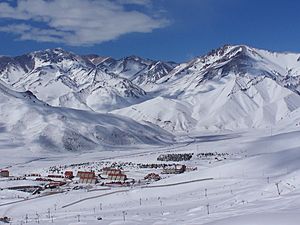
There have been a few tries to hold Winter Pan American Games, but they haven't been very successful. The organizers of the 1951 games in Buenos Aires wanted to have winter events later that year, but not enough people were interested. Another problem is that the Americas cover both the northern and southern parts of the world, so when it's winter in one part, it's summer in the other!
Lake Placid, New York tried to organize Winter Games in 1959, but again, not enough countries wanted to join. So, those plans were canceled.
In 1988, PASO decided to hold the first Pan American Winter Games in Las Leñas, Argentina, in September 1989. They also agreed to hold them every four years. But there wasn't enough snow, so the games were moved to September 16–22, 1990. Only eight countries sent 97 athletes to Las Leñas. Most of them (76) were from Argentina, Canada, and the United States. The weather was unusually warm, and there was still little snow. So, only three skiing events were held: Slalom, Giant Slalom, and Super G. The United States and Canada won all 18 medals!
PASO chose Santiago, Chile, to host the second Winter Pan American Games in 1993. But the United States said they wouldn't come unless a full schedule of events was held. The Santiago organizers eventually gave up, and the idea of Winter Pan Am Games hasn't been brought up since.
Junior Pan American Games
On January 16, 2019, PASO announced a new event: the Junior Pan American Games. These games are like the Youth Olympic Games and are only for athletes under 21 years old. They also need less big stadiums and cost less money to host.
For the first Junior Games, cities like Cali, Colombia; Santa Ana, El Salvador; and Monterrey, Mexico wanted to host. Cali was chosen as the host city on March 27, 2019.
Asunción, Paraguay, was chosen to host the 2025 Junior Pan American Games.
Pan American Sports Organization (PASO)
The Pan American Games Movement includes many national and international sports groups, media partners, athletes, and officials. All of them agree to follow the rules of the Olympic Charter, which is also PASO's rulebook. PASO is the main organization for the Olympic Movement in the Americas. It chooses the host city, helps plan the games, approves the sports program, and handles sponsorships and TV rights.
The Pan American Games Movement has three main parts:
- International Federations (IFs) are the groups that manage a sport around the world. For example, FIFA is the IF for soccer, and Fédération Internationale de Volleyball (FIVB) is for volleyball. There are 36 IFs in the Pan American Games Movement, one for each sport.
- National Olympic Committees (NOCs) represent and manage the Pan American Games movement in each country. For example, the United States Olympic Committee (USOC) is the NOC for the United States. PASO recognizes 41 NOCs.
- Organizing Committees for the Pan America Games (PAOGs) are temporary groups that organize a specific Pan American Games. They are dissolved after the games are over and they deliver their final report to PASO.
Spanish and English are the official languages of the Pan American Games Movement. The language of the host country is also used. For example, at the 2007 Pan American Games in Brazil, Brazilian Portuguese was also used. Important announcements, like when each country enters during the opening ceremony, are spoken in these languages.
Symbols of the Games
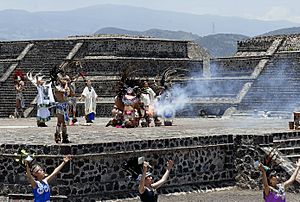
The Pan American Games use special symbols to show the ideas of the Pan American Games charter. The Pan American Sports Organization flag has the PASO logo on a white background. In 1988, the Olympic Rings were added to the flag to show the strong connection between PASO and the International Olympic Committee. This flag is raised at every games. Until 2007, the Olympic Hymn was played when the flag was raised. In 2011, a new Pan Am Games anthem was played for the first time. This anthem was chosen in 2007 and officially adopted in 2008.
Like the Olympic flame, the Pan American Games flame is lit before the games begin. For the first games, the flame was lit in Olympia, Greece. For later games, the torch has been lit in a special ceremony that copies an ancient Aztec "new fire ceremony." These ceremonies were first held in Cerro de la Estrella National Park in Mexico City and later moved to the Pyramid of the Sun in the Teotihuacan Pyramids Complex. The only exception was for the São Paulo games in 1963, when the torch was lit in Brasília by the native Guaraní people. An Aztec elder lights the torch of the first person in the relay. This starts the Pan American torch relay, which carries the flame to the main stadium in the host city. The flame plays a very important part in the opening ceremony. Since 2011, the flame must burn in the stadium where the track and field events are held. If the opening ceremony and track and field are in different stadiums, the flame is moved. Sometimes, the flame burns in a cauldron outside the main stadium.
The Pan American Games mascot is an animal or human figure that shows the culture of the host country. Mascots were first used in 1979 in San Juan, Puerto Rico. They are important for the games' identity and promotion. The mascot for the most recent Pan American Games in Santiago, Chile, was Fiu, a colorful bird called a seven-colored rush tyrant.
Here are some past Games mascots:
- San Juan 1979: Coqui (a frog)
- Caracas 1983: Santiaguito (a lion)
- Indianapolis 1987: Amigo (a green parrot)
- Havana 1991: Tocopan (a bird)
- Mar del Plata 1995: Lobi (a sea lion)
- Winnipeg 1999: Duck and Lorita (ducks)
- Santo Domingo 2003: Tito (a manatee)
- Rio de Janeiro 2007: Cauê (the sun)
- Guadalajara 2011: Huichi (a deer), Gavo (an agave plant), and Leo (a lion)
- Toronto 2015: Pachi (a porcupine)
- Lima 2019: Milco (a statue)
- Santiago 2023: Fiu (a many-colored rush tyrant bird)
Ceremonies
Opening Ceremony
The opening ceremony of the Pan American Games has several important parts. The organizers of each games can choose the order of the program. However, since 2007, the ceremony usually starts with the host country's national anthem. Then, the "parade of nations" happens, where athletes march in groups by country. Argentina traditionally enters first to honor where the games began, just like Greece enters first in the Olympic Games. Other countries usually enter in alphabetical order based on the host country's language. The host country's athletes always enter last.
After the parade, speeches are given to officially open the games. The PANAM Sports Flag and Olympic Flag are raised, and athletes take oaths. Then, the host country presents amazing artistic shows with music, singing, dancing, and theater that show its culture and history. These shows have become bigger and more complex over time, as each host tries to make their ceremony unforgettable. For example, the opening ceremony of the 2011 Games in Guadalajara, Mexico, reportedly cost $20 million!
Finally, the Pan American torch is carried into the stadium. It is passed from one person to another until it reaches the last torchbearer. This person is often a famous and successful athlete from the host country. They use the torch to light the Pan American Games flame in the stadium's cauldron.
Closing Ceremony
The closing ceremony happens after all the sports events are finished. Flag-bearers from each country enter the stadium, followed by all the athletes, who walk in together without being grouped by country.
Two flags are raised while their national anthems play: the flag of the current host country and the flag of the country that will host the next Pan American Games. The head of the organizing committee and the president of PASO give speeches to officially close the games. They invite everyone to the next games. The PanAm Sports Flag and the Olympic Flag are lowered, and the Pan-American flame is put out.
In a special tradition called the Antwerp Ceremony, the leader of the city that hosted the games gives a special Pan American Games flag to the president of PASO. The PASO president then passes it to the leader of the city hosting the next games. After these official parts, the next host country gives a short presentation with artistic shows of its culture. This presentation can be about fifteen minutes long.
Medal Presentation
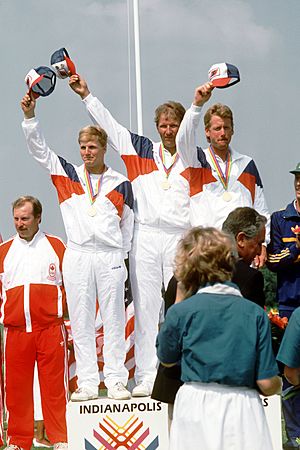
After each event, medals are given to the athletes who finish first, second, and third. The winners get gold medals, second place gets silver, and third place gets bronze. In some sports, like boxing, where there isn't a third-place match, both athletes who lose in the semifinals get bronze medals. PASO doesn't officially track medal counts, but countries and the media do, to see how well their athletes performed.
Sports at the Games
Here are some of the sports that have been part of the Pan American Games:
|
|
Medals and Top Countries
Athletes or teams who finish first, second, or third in each event receive medals. First place gets gold, second gets silver, and third gets bronze. In some events, like boxing, where there isn't a match for third place, both athletes who lose in the semifinals get bronze medals. PASO doesn't keep official medal statistics, but countries and the news media do, to show how successful their athletes are.
Here are the top ten nations in the history of the Summer Pan American Games, based on medals won:
| Rank | Nation | Gold | Silver | Bronze | Total |
|---|---|---|---|---|---|
| 1 | 2,188 | 1,617 | 1,194 | 4,999 | |
| 2 | 938 | 642 | 613 | 2,193 | |
| 3 | 537 | 776 | 918 | 2,231 | |
| 4 | 449 | 476 | 656 | 1,581 | |
| 5 | 343 | 391 | 501 | 1,235 | |
| 6 | 310 | 362 | 617 | 1,289 | |
| 7 | 165 | 208 | 296 | 669 | |
| 8 | 110 | 235 | 317 | 662 | |
| 9 | 69 | 141 | 205 | 415 | |
| 10 | 48 | 82 | 146 | 276 | |
| Totals (10 entries) | 5,157 | 4,930 | 5,463 | 15,550 | |
| Rank | Nation | Gold | Silver | Bronze | Total |
|---|---|---|---|---|---|
| 1 | 4 | 2 | 5 | 11 | |
| 2 | 2 | 4 | 1 | 7 | |
| Totals (2 entries) | 6 | 6 | 6 | 18 | |
List of Pan American Games Host Cities
The Pan American Games have been held in 17 cities across 11 countries. Mexico and Canada have hosted the games three times each, more than any other nation. Only Winnipeg and Mexico City have hosted the games twice.
The host city for a Pan American Games is usually chosen about six to seven years before the event. Since 2024, cities or regions can apply to host the games. They present their ideas to their country's National Olympic Committee. If more than one city from the same country wants to host, their national committee usually picks one, because only one bid per country can be sent to PASO.
Then, the first phase begins. Cities fill out a questionnaire about how they would organize the games. They must promise to follow the Olympic Charter and PASO's rules. Experts from PASO review these plans to see which cities have the best chance to host. Based on this, PASO's Executive Board chooses which cities can move to the next stage.
In the next stage, the chosen cities give a bigger and more detailed presentation of their project. An evaluation team visits these cities, talks to local officials, and checks out the possible sports venues. They write a report about what they find. The bidding city must also show that it can pay for the games. Finally, a list of candidates is presented to the General Session of PASO. The members of PASO vote on the host city. Once a city is chosen, it signs a contract with PASO, officially becoming a Pan American Games host.
| Edition | Year | Host city | Host nation | Opened by | Start date | End date | Nations | Competitors | Sports | Events | Top placed team |
|---|---|---|---|---|---|---|---|---|---|---|---|
| 1 | 1951 | Buenos Aires | President Juan Domingo Perón | February 25 | March 9 | 21 | 2,513 | 18 | 140 | ||
| 2 | 1955 | Mexico City | President Adolfo Ruiz Cortines | March 12 | March 26 | 22 | 2,583 | 17 | 146 | ||
| 3 | 1959 | Chicago | Milton S. Eisenhower | August 27 | September 7 | 25 | 2,263 | 15 | 166 | ||
| 4 | 1963 | São Paulo | Governor Adhemar de Barros | April 20 | May 5 | 22 | 1,665 | 19 | 160 | ||
| 5 | 1967 | Winnipeg | Prince Philip | July 23 | August 6 | 29 | 2,361 | 19 | 169 | ||
| 6 | 1971 | Cali | President Misael Pastrana Borrero | July 30 | August 13 | 32 | 2,935 | 17 | 164 | ||
| 7 | 1975 | Mexico City | President Luis Echeverría | October 12 | October 26 | 33 | 3,146 | 19 | 190 | ||
| 8 | 1979 | San Juan | Governor Carlos Romero Barceló | July 1 | July 15 | 34 | 3,700 | 21 | 249 | ||
| 9 | 1983 | Caracas | President Luis Herrera Campins | August 14 | August 29 | 36 | 3,426 | 22 | 249 | ||
| 10 | 1987 | Indianapolis | Vice President George H. W. Bush | August 7 | August 23 | 38 | 4,360 | 27 | 296 | ||
| 11 | 1991 | Havana | President Fidel Castro | August 2 | August 18 | 39 | 4,519 | 28 | 331 | ||
| 12 | 1995 | Mar del Plata | President Carlos Menem | March 12 | March 26 | 42 | 5,144 | 34 | 408 | ||
| 13 | 1999 | Winnipeg | Governor General Roméo LeBlanc | July 23 | August 8 | 42 | 5,083 | 34 | 330 | ||
| 14 | 2003 | Santo Domingo | President Hipólito Mejía | August 1 | August 17 | 42 | 5,223 | 34 | 338 | ||
| 15 | 2007 | Rio de Janeiro | Carlos Arthur Nuzman | July 13 | July 29 | 42 | 5,633 | 33 | 331 | ||
| 16 | 2011 | Guadalajara | President Felipe Calderón | October 14 | October 30 | 42 | 5,996 | 36 | 361 | ||
| 17 | 2015 | Toronto | Governor General David Johnston | July 10 | July 26 | 41 | 6,123 | 36 | 364 | ||
| 18 | 2019 | Lima | President Martín Vizcarra | July 26 | August 11 | 41 | 6,668 | 38 | 419 | ||
| 19 | 2023 | Santiago | President Gabriel Boric | October 20 | November 5 | 41 | 6,909 | 39 | 425 | ||
| 20 | 2027 | Lima | TBD | July 16 | August 1 | 41 | TBD | 36 | TBD | TBD | |
| 21 | 2031 | TBD | TBD | TBD | TBD | TBD | 41 | TBD | TBD | TBD | TBD |
Participating Nations
As of the 2023 games, 35 countries and six territories compete in the Pan American Games. Their National Olympic Committees are recognized by the Pan American Sports Organization.
 Antigua and Barbuda
Antigua and Barbuda Argentina
Argentina Aruba
Aruba Bahamas
Bahamas Barbados
Barbados Belize
Belize Bermuda
Bermuda Bolivia
Bolivia Brazil
Brazil British Virgin Islands
British Virgin Islands Canada
Canada Cayman Islands
Cayman Islands Chile
Chile Colombia
Colombia Costa Rica
Costa Rica Cuba
Cuba Dominica
Dominica Dominican Republic
Dominican Republic Ecuador
Ecuador El Salvador
El Salvador Grenada
Grenada Guatemala
Guatemala Guyana
Guyana Haiti
Haiti Honduras
Honduras Jamaica
Jamaica Mexico
Mexico Nicaragua
Nicaragua Panama
Panama Paraguay
Paraguay Peru
Peru Puerto Rico
Puerto Rico Saint Kitts and Nevis
Saint Kitts and Nevis Saint Lucia
Saint Lucia Saint Vincent and the Grenadines
Saint Vincent and the Grenadines Suriname
Suriname Trinidad and Tobago
Trinidad and Tobago United States
United States Uruguay
Uruguay Venezuela
Venezuela Virgin Islands
Virgin Islands
See also
 In Spanish: Juegos Panamericanos para niños
In Spanish: Juegos Panamericanos para niños
- Junior Pan American Games
- Pan American Winter Games
- Parapan American Games
- Parapan Youth American Games
- Central American and Caribbean Games
- Central American Games
- South American Games
- Pan American Sports Festival
- African Games
- Asian Games
- South Asian Games
- West Asian Games
- Central Asian Games
- Southeast Asian Games
- European Games
- Pacific Games
- Olympic Games
- World Games
- Commonwealth Games
 | Aaron Henry |
 | T. R. M. Howard |
 | Jesse Jackson |


